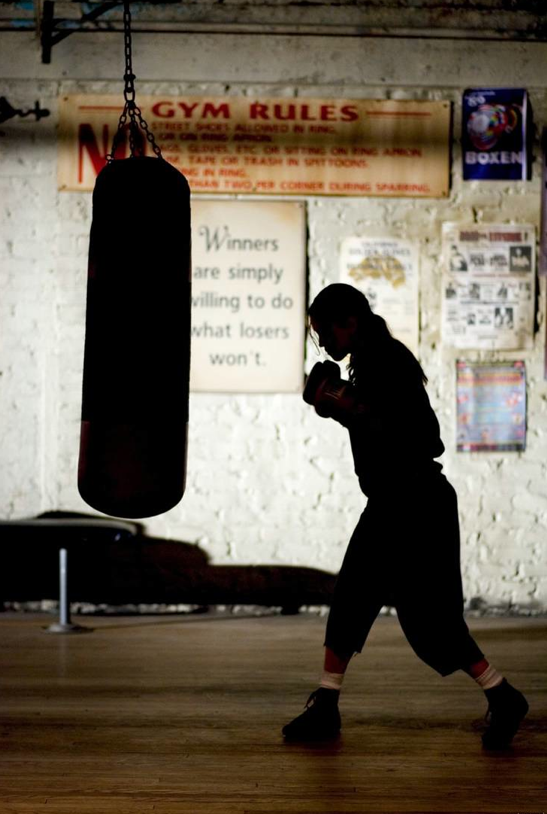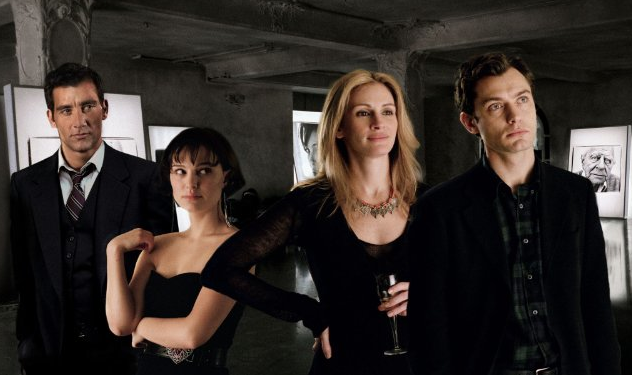Friday
Dec242004
Angels & Devils (Million Dollar Baby & Closer)
 Friday, December 24, 2004 at 2:17PM
Friday, December 24, 2004 at 2:17PM  MILLION DOLLAR BABY
MILLION DOLLAR BABYBoxing is the most violent of mainstream sports. Other two person contests like, say, tennis don't require beating your opponent senseless to win. So, when I think of boxing and the movies, I think not to the popular Rocky and his personal triumphs but to the savagery of Raging Bull's relentless biography. Based on advanced word and critical reaction you can safely assume that Million Dollar Baby will join those two classic films to form the undisputed trinity of major boxing flicks. Yet for a film detailing such a violent activity it's kind heart strikes me sometimes as an overly facile fit for the genre.
Baby is essentially a three hander about a gym owner and trainer Frankie (Clint Eastwood) his employee and confidant "Scrap" (Morgan Freeman) and Maggie (Hilary Swank) a hillbilly with a dream. She wants to make something of her life and she's come to view fighting professionally as her one and only shot at doing so. Reluctantly Frankie, who has never trained a woman and who is nearly through with boxing, takes her under his wing. All three of the roles are well cast and the actors do charming work. There are some wonderful character bits sprinkled throughout the tale but Frankie, Maggie, and Scrap remain "types" rather than character. The narrative also traffics in comfortable cliché; the familiar and comfy 'grumpy old men' banter between Freeman and Eastwood, The rags to riches journey of Maggie as she becomes a champion. Million Dollar Baby may be overly familiar, but it's so well played and artistically presented that it's quite pleasurable to watch.
The use of types rather than true characterizations limits the film's serious reach for greatness but it succeeds in winning its audience over. Boxing may be a risky life-threatening sport for its contenders but the movie always plays it safe. All three of the protagonists are exceedingly likeable with no visible flaws to turn off audience sympathies or engagement. Maggie, a forceful but warm Hilary Swank, has no defining characteristics outside of her status as poor "trash" (the movie's description of her as well) and her ambition to be a fighter. Frankie has an estranged hurtful relationship with his unseen daughter yet nothing in his character suggests any sins he could have committed to have left such lifelong scars. As written and portrayed he is a big hearted, generous, and unwaveringly loyal. Scrap is a retired boxer who shares these admirable character traits. He's also a defender of the down and out. Essentially all three characters are saints. There's not a mean streak in any of their bodies. For a movie bathed in beautiful chiaroscuro cinematography, the darkness is strictly external. These characters are filled with light. So what are they doing in the violent kill-or-be-killed world of boxing?
This is not to say that Million Dollar Baby is too "soft" for its own good or its own genre as "no nonsense" spirits and hardened physiques are on display. And even the audience pandering perfection of the heroes serves as an expert manipulative maneuver for the film's big knockout. The films third act gets at some tough truths about the inevitably of tragedy and ethical conundrums, whether in boxing or in life. Bad things do happen to good people after all. The sport seems to be serving rather obviously as metaphor for hard knocks rather than as a realistic milieu. Which is all well and good, I suppose, for such an essentially strong yarn. Director Clint Eastwood and screenwriter Paul Haggis may appear to be bleeding hearts but when the time comes, they doesn't hesitate to deliver that killer final blow. You'll probably stay down for the count.
B/B+
B/B+
 Love is the Devil: Clive, Anna, Julia & Jude
Love is the Devil: Clive, Anna, Julia & JudeCLOSER
While Million Dollar Baby spends a lot of time dancing in the ring, Closer is the current release with the deadliest right hook and the most unique fighting style. Originally written for the stage, Closer tells the stories of a warring quartet of desperate and cruel hearts. The four characters Dan (Jude Law), Alice (Natalie Portman), Larry (Clive Owen), and Anna (Julia Roberts) and their ever shifting duels/confrontations are the focus. With only minor exceptions each scene is a two hander with half of the ensemble present for a major transition; a meeting, a breakup, a long-boiling confrontation, the beginning of an affair. But in these emotional conflicts there's no one to root for. All the characters have hearts in their eyes but devils on their shoulder.
It's an exceedingly theatrical conceit, and the director Mike Nichols has a long history of embracing the theatrical in his filmography, making his name with Who's Afraid of Virginia Woolf in the 60s and recently having a major comeback with the television version of Angels in America both of which were famous and lauded plays before Nichols converted them into acclaimed films. He isn't shy about stylization and this play which characterizes the heart as a "fist covered in blood" needs that vote of confidence. In fact, Closer has such an abstract theatrical conceit (its structure being transitional sequences only) and such highly stylized language (Patrick Marber the playwright adapts his own work for the screen and does not de-stageify the text) that it maybe could have been pushed even further in the style direction.
The film's perfect opening sequence will acclimate the more attentive audiences into the movie's stylized world. It's a slow motion meeting between Alice and Dan set to the entire Damien Rice song "The Blower's Daughter" and it proves a dreamy and purposely "off" way to drop you into the film's conceit. At first the scene appears to be romantic, a traditional "meet cute" opening if you will but it ends abruptly with a car accident (Alice is hit crossing the street). Love, you see, is dangerous stuff.
From there on out Closer is a slightly uneven affair with its series of minor clashes and colossal scarring showdowns. It's a dream of an actor's showcase and all four principal's are clearly working hard throughout. Jude Law for his part embraces his characters pettiness. Though it's a brave move his movie star charisma is running on fumes in this particular film. Julia Roberts fares better. She's a pleasant surprise in one of her most unusual roles. Her Anna is a very unhappy woman. At one point during a confession to her lover she whispers "I'm disgusting" Julia keys you in here to Anna's self absorption; she wields this self-loathing as both a weapon and as an excuse for her unattractive behavior. Natalie Portman's Alice makes far less sense as a character but as an example of a movie star ascending, Portman is hypnotic. And, saving the best for last, Clive Owen owns the film as the bullying Larry who is, surprisingly, perhaps the most romantic of the lot.
If Closer doesn't completely gel, it still offers a number of dynamite sequences and fascinating performances as well as food for thought. The characters may appear to be less than three dimensional but we are only, by the structure of the piece, seeing them at their most vulnerable, trapped, or ugliest moments. Closer is harrowing nightmare stuff for the sentimentalists but the realists will admit that no one is an angel during a breakup. Love, at least when it's ending, is the Devil.
B+/A-



Reader Comments